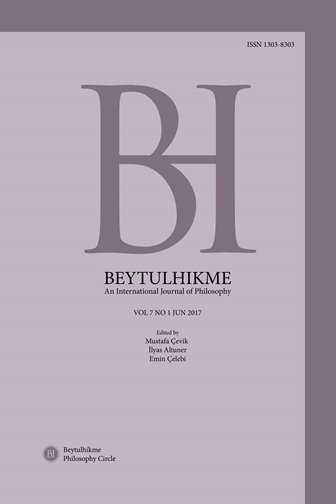Thomas Nagel’ın 'Fizikalizm' ve 'Yarasa Olmak Nasıl Bir Şeydir' Makalelerinin Bilince Nesnel Bir Açıklama Verme Arayışı Açısından Kıyaslanması
Author :
Abstract
Thomas Nagel’ın “Yarasa Olmak Nasıl bir Şeydir” makalesi (1974) ve “Hiçbir Yerden Bakış” (1986) adlı kitabı aşırı derecede alıntılanmış iki eserdir. Buradaki argümanlar sıklıkla (i) bilincin öznel boyutunun nesnel-bilimsel bir açıklamasının tümüyle yapılabilmesinin mümkün olmadığını gösteren, veya (ii) fizikalizmin sıkıntılarını dile getiren, veya (iii) düpedüz fizikalizmin bir reddi olarak algılanmış veya kullanılmışlardır. Bu çalışmamda her üç algının da, değişen oranlarda, hatalı olduğunu savunuyorum. Tezimi savunabilmek için, söylediğim üç ana yorumun, her birini özetliyor ve bunların her birinin neden yanlış olduğunu gösteriyorum. Böylelikle Nagel’ın ana projesi olan nesnel fenomenoloji önerisini öne çıkararak tüm bu hataların bu projenin genelde pek incelenmemesi veya incelendiğinde yanlış algılanmasına dayandığını ortaya koyuyorum. Bunları ikna edici şekilde yapmak için gösterdiğim gerekçeler nihayetinde Nagel’ın nesnel fenomenoloji projesi aracılığıyla “bilincin öznel karakterini nesnel bir şekilde açıklamaya çalıştığı” şeklindeki ikinci tezimi destekleyecektir.
Keywords
Abstract
“What is it Like to be a Bat” (1974) and “The View from Nowhere” (1986) of Thomas Nagel are two extremely cited pieces of analytic philosophy in the last century. The arguments presented in those works have been frequently cited as either problems of giving an objective-scientific account of consciousness or an outright denial of the possibility of a physicalist characterization of it. After summarizing all of them, I turn to show why they are mistaken. By this, I hope I will be able to show that all these mistakes are originated from either blatantly ignoring his objective phenomenology project or misunderstanding it. The reasons that I use to explain these misperceptions would also suggest that Nagel’s objective phenomenology project is some sort of constructing a theoretical and conceptual ground to have an objective account of the subjective aspect of experience.
Keywords
- Alıcı, T. (2013). Gerçek Bir Yanılsama. Bilinç. İstanbul: Metis.
- Allen, C., & Bekoff, M. (2007). Animal Consciousness. In M. Velmans & S. Schneider (Eds.), The Blackwell Companion to Consciousness (pp. 58–71). Blackwell Publishing.
- Bickle, J., Mandik, P., & Landreth, A. (2012). The Philosophy of Neuroscience. In E. N. Zalta (Ed.), The Stanford Encyclopedia of Philosophy (Summer 201). Retrieved from http://plato.stanford.edu/archives/sum2012/entries/neuroscience/
- Churchland, P. M. (1985). Reduction, Qualia, and the Direct Introspection of Brain States. The Journal of Philosophy, 82(1), 8. http://doi.org/10.2307/2026509
- Crane, T. (2007). Cosmic Hermeneutics vs. Emergence: The Challenge of the Explanatory Gap. In C. Penco & M. Beaney (Eds.), Explaining the Mental: Naturalist and Non-Naturalist Approaches to Mental Acts and Processes (pp. 22– 34). Newcastle: Cambridge Scholars Publishing.
- Davidson, D. (1980). Action and Events. New York: Oxford University Press.
- Dennett, D. C. (1991a). Consciousness Explained. New York: Back Bay Books.
- Dennett, D. C. (1991b, May). Review of McGinn, The Problem of Consciousness. The Times Literary Supplement. Retrieved from https://ase.tufts.edu/cogstud/dennett/papers/mcginn.htm
- Flanagan, O. (1985). Consciousness, Naturalism, and Nagel. Journal of Mind and Behavior, 6(3), 373–390.
- Foss, J. (1993). Subjectivity, Objectivity and Nagel on Consciousness. Dialogue, 32(4), 725–736. http://doi.org/10.1017/S0012217300011367
- Gulick, R. Van. (2016). Consciousness. In Stanford Encyclopedia of Philosophy (Winter 201).
- Levine, J. (2007). Anti-materyalist Arguments and Influential Replies. In M. Velmans & S. Schneider (Eds.), The Blackwell Companion to Consciousness (pp. 371–380). Blackwell Publishing.
- Lycan, W. G. (2003). Philosophy of Mind. In N. Bunnin & E. P. Tsui-James (Eds.), The Blackwell Companion to Philosophy (2nd ed., pp. 173–201). Blackwell Publishing.
- McGinn, C. (1989). Can We Solve the Mind–Body Problem? Mind, XCVIII(391), 349–366. http://doi.org/10.1093/mind/XCVIII.391.349
- Nagasawa, Y. (2003). Thomas vs. Thomas: A New Approach to Nagel’s Bat Argument. Inquiry, 46(3), 377–394. http://doi.org/10.1080/00201740310002415
- Nagel, T. (1965). Physicalism. The Philosophical Review, 74(3), 339–356. http://doi.org/10.2307/2183358
- Nagel, T. (1974). What is it like to be a bat? The Philosophical Review, 83(4), 435– 450. http://doi.org/10.2307/2183914
- Nagel, T. (1986). The View From NoWhere. Oxford and New York: Oxford University Press.
- Nagel, T. (1998). Conceiving the Impossible and the Mind-Body Problem. Philosophy, 73(285), 337–352. http://doi.org/10.1017/S0031819198000035
- Nagel, T. (2012). Mind and Cosmos: Why the Materialist Neo-Darwinian Conception of Nature Is Almost Certainly False. Oxford and New York: Oxford University Press.
- Nagel, T. (2015a). Yarasa Olmak Nasıl bir Şeydir? In Ö. Ç. Aksoy (Trans.), Zihin ve Evren (1st ed., pp. 145–165). İstanbul: Jaguar Kitap.
- Nagel, T. (2015b). Zihin ve Evren. (Ö. Ç. Aksoy, Trans.) (1st ed.). İstanbul: Jaguar Kitap.
- Nemirow, L. (1980). Mortal Questions by Thomas Nagel. The Philosophical Review, 89(3), 473–477. http://doi.org/10.2307/2184400
- Rorty, R. (1970). In defense of eliminative materialism. Review of Metaphysics, 24(September), 112–121.
- Thagard, P. (2012). The self as a system of multilevel interacting mechanisms. Philosophical Psychology, (January 2014), 1–19. http://doi.org/10.1080/09515089.2012.725715
- Thomas, A. (2009). Thomas Nagel. Acumen.
- Wider, K. (1990). Overtones of Solipsism in Thomas Nagel’s “What is it Like to be a Bat?” and the View from Nowhere. Philosophy and Phenomenological Research, 50(3), 481–499. http://doi.org/10.2307/2108160
- Wider, K. (1992). The Desire to Be God: Subjective and Objective in Nagel’s The View from Nowhere and Sartre’s Being and Nothingness. Journal of Philosophical Research, 17, 443–463. http://doi.org/10.5840/jpr_1992_8
- Williams, B. (1986). A Passion for the Beyond: review of “The View from Nowhere” by Thomas Nagel. London Review of Books, 8(14), 5–6. Retrieved from https://www.lrb.co.uk/v08/n14/bernard-williams/a-passion-for-thebeyond
- (1974) ve “Hiçbir Yerden Bakış” (1986) adlı kitabı aşırı derecede





